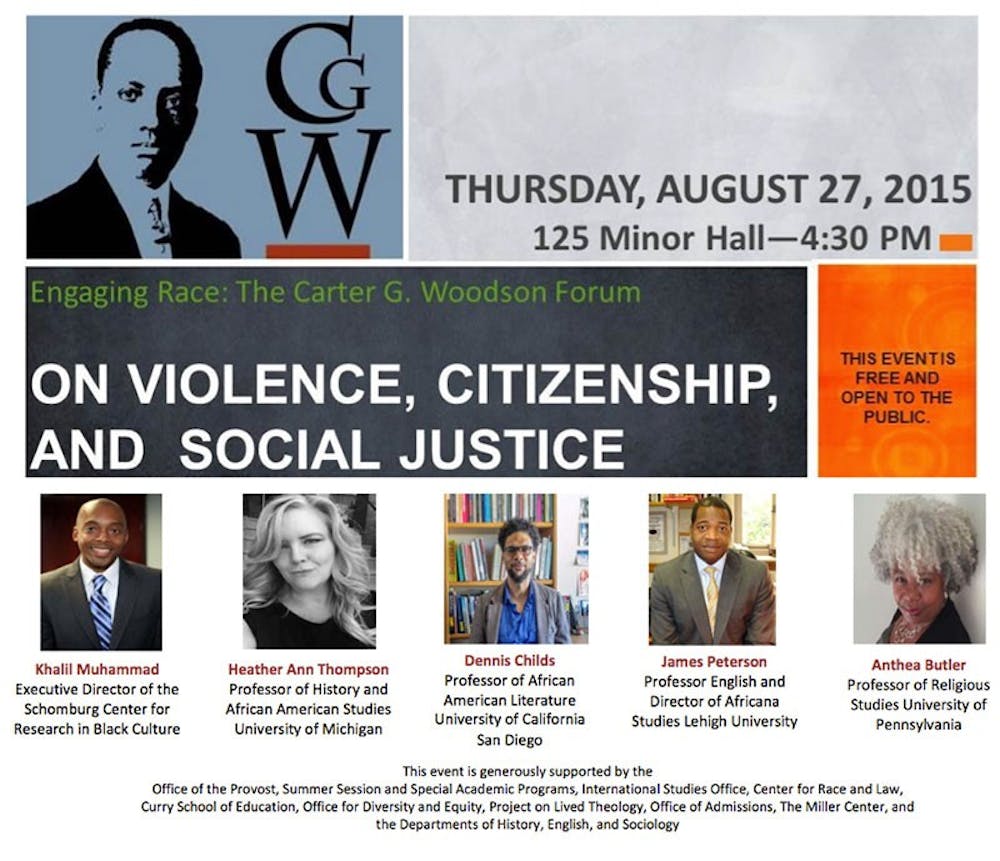A forum held at the University Thursday afternoon gave hundreds of students, faculty and community members the opportunity to discuss the recent spate of race-related violence across the country.
The event, hosted by the Carter G. Woodson Institute for African-American and African Studies was organized in response to gun violence against unarmed black individuals in Charleston, Ferguson and Staten Island, Woodson Institute Director Deborah McDowell said.
“The general goals were to inform and enlighten the public and to allow for dialogue and exchange about a matter of vital significance not just to our university, but also to our nation,” McDowell said.
McDowell reached out to the five panelists, each from a research institute or university, after nine people were shot in a historically black Charleston church in June.
Panelist James Peterson, associate professor of English and director of Africana studies at Lehigh University, said McDowell did a good job convening a representative group of leading scholars on race and social justice.
At the event, Peterson shared his experience attending the Emanuel A.M.E. Church in Charleston after the massacre.
“I talked about what was going on and what things that the church has to do to recover now that the cameras and media are gone,” Peterson said.
Dennis Childs, professor of literature at the University of California, San Diego, said he accepted the invitation to speak at the forum because he felt it was crucial for students and community members to have a studied articulation of events such as the Charleston church shooting.
“It is important for people in the academy who study this to participate in forums to give people an opportunity to think about the events not in isolation, but in historical context,” Childs said. “There is a long history of racial violence.”
During his talk, Childs explained how America's current prison system, which incarcerates black Americans at a disproportionally high rate, comes from a historical tradition of slavery.
“A lot of the modalities of violence that slaves endured all the way up to 1865 were reformulated,” Childs said.
Childs also critiqued the discourse of tragedy that surrounds Michael Brown, an 18-year-old black man fatally shot by a white Ferguson police officer; Jamycheal Mitchell, a young black man who died of starvation in a Virginia jail after spending months behind bars without bail for stealing items worth $5 from a 7-Eleven; and William Chapman, an unarmed black 18-year-old who was shot dead by a police officer in Portsmouth, Virginia.
“What the discourse of tragedy does is keep us from recognizing the structural aspects of racial and police violence and the system of criminalization in the United States,” Childs said.
McDowell said she agrees these incidents are part of a larger issue of police violence.
“These are not isolated incidents,” McDowell said. “We cannot view this problem of police violence through the lens of exceptionalism or by invoking the bad apple.”
Peterson said one of the biggest takeaways from the forum is the fight for racial justice is far from over.
“We have to sustain our engagement with issues of race and racial injustice,” Peterson said. “We have to continue our work.We have to keep pushing and keep wrestling with the tough issues.”
Students asked how they could get involved during the question and answer period of the event, and in response McDowell said there are courses at the University available to students.
“There are classes at the University that are devoted to taking up the issues we discussed in the forum in an intellectually substantive and complex way,” McDowell said.
Childs emphasized the difference students can make by taking leadership roles in the issues discussed.
“Students have an opportunity to educate themselves as the brightest minds in the country, [and then] take part in a broader project of political education,” Childs said.
Khalil Muhammad, executive director of the Schomburg Center for Research in Black Culture and Heather Thompson, associate professor of history at the University of Michigan, were also panelists at the event.







